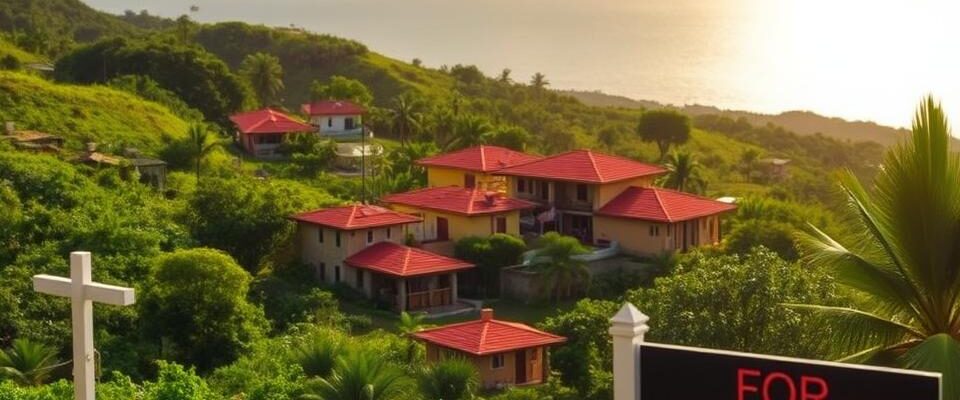Home Selling Expenses in Costa Rica: What You Need to Know
At Gap Real Estate (Grupo Gap LLC SRL), we simplify the process of buying, selling, or investing in Costa Rica’s thriving real estate market. With over two decades of coast-to-coast experience, we deliver seamless transactions through expert guidance and clear communication.
Selling property in Costa Rica involves various costs, typically ranging between 4% and 6% of the property’s sale price. These expenses include legal fees, transfer taxes, realtor commissions, escrow fees, and other charges.
Understanding the breakdown of these expenses is crucial for sellers to prepare financially. Our expertise will guide you through the process, helping you navigate the unique characteristics of Costa Rica’s property market and avoid common pitfalls.
Understanding the Costa Rican Real Estate Market
Understanding the intricacies of Costa Rica’s real estate market is crucial for anyone looking to sell their property in this Central American country. The market’s dynamics play a significant role in determining selling expenses and the overall success of a property sale.
Current Market Trends in Costa Rica
The Costa Rican real estate market is experiencing steady growth, particularly in coastal areas and expat-friendly communities. This growth creates opportunities for both buyers and sellers. Foreign investment continues to drive significant portions of the market, especially in tourist destinations and retirement communities. As a result, understanding current market trends is essential for setting realistic price expectations and preparing for the selling process.
Unique Aspects of Property Transactions in Costa Rica
Costa Rica’s property transaction processes differ significantly from those in many North American or European markets. The legal framework for property ownership has specific requirements for both domestic and international sellers. Additionally, Costa Rica’s property registration system through the National Registry provides security but requires specific documentation and processes that influence selling expenses. For instance, when a mortgage is issued at the time of sale, the borrower is required to pay all mortgage drafting and registration fees, which include approximately 0.5% of the mortgage amount for registration and an additional 1.25% for notary fees.
The market for sustainable and eco-friendly properties is also growing, potentially affecting property values and attractiveness to certain buyer segments. Sellers who understand these unique aspects can better navigate the market and minimize their selling expenses.
Home Selling Expenses in Costa Rica: A Complete Breakdown
When selling a property in Costa Rica, understanding the various expenses involved is crucial for a smooth transaction. As we delve into the specifics, it becomes clear that several costs are associated with the sale of a property.
Transfer Tax and Registration Stamps
The transfer tax in Costa Rica is a significant expense, calculated at 1.5% of the property’s value, based on either the purchase price or the fiscal value, whichever is higher. Additionally, registration stamps are fees associated with registering the sale with the National Registry, totaling approximately 0.85% of the property value. These stamps are distributed among various entities, including the National Registry, Municipal, and Agrarian stamps.
Legal and Notary Fees
Legal and notary fees are another significant cost, typically ranging from 1% to 1.5% of the sale price, plus a 13% VAT on the legal fees. Notary publics play a crucial role in property transfers, as they are legally required to oversee and certify the transfer of ownership. The complexity of the transaction can affect the exact percentage charged.
Escrow Fees and Services
Escrow services, while not mandatory, provide security for both parties by holding funds until all conditions of the sale are met. The average cost of an escrow fee is 0.25% of the purchase price of the home. This service ensures that the transaction is secure and that both parties fulfill their obligations.
Realtor Commissions
Realtor commissions in Costa Rica tend to be higher than in North America or Europe, typically ranging from 5% to 6% of the property sale price, but sometimes reaching up to 10% for lower-priced properties. Understanding these commissions is essential for sellers to accurately calculate their net proceeds.
Understanding these fees in advance allows sellers to accurately calculate their net proceeds and avoid financial surprises during the closing process. The total closing costs for selling property in Costa Rica generally amount to approximately 4-6% of the sale price when all expenses are combined.
Who Pays for What: Buyer vs. Seller Responsibilities
When selling a property in Costa Rica, understanding the division of costs between the buyer and seller is crucial. The allocation of closing costs can significantly impact the overall expense of the transaction.
Standard Cost-Sharing Practices
In Costa Rica, the standard practice is to split closing costs 50/50 between the buyer and seller, although this can be negotiated as part of the purchase agreement. Typically, sellers are responsible for paying any outstanding property taxes, utility bills, and homeowners association fees up to the date of closing. Buyers, on the other hand, generally cover mortgage-related expenses if they’re financing the purchase. The allocation of these costs should be clearly specified in the purchase agreement to avoid misunderstandings.
Negotiating Closing Costs
The allocation of closing costs can be a negotiable part of the offer process. In a seller’s market, sellers may successfully negotiate for buyers to cover a larger portion or even all of the closing costs. Understanding which costs are legally mandated to be paid by specific parties versus those that are customarily shared can strengthen your negotiating position. It’s also important to note that escrow fees are sometimes negotiated separately from other closing costs. Clearly outlining the allocation of closing costs in the purchase agreement is essential to avoid disputes during the closing process.
Calculating Your Selling Expenses: Practical Examples
When selling a property in Costa Rica, understanding the various expenses involved is crucial for calculating your net proceeds. To illustrate this, let’s consider two examples of property sales at different price points.
Example for a $100,000 Property Sale
For a property sale valued at $100,000 in Costa Rica, the total closing costs typically range from $4,000 to $6,000 when split between the buyer and seller. The transfer tax for this property would be $1,500 (1.5% of the sale price), while registration stamps would total around $890.
Legal and notary fees for a $100,000 property sale would typically range from $1,000 to $1,500, depending on the complexity of the transaction. Realtor commissions, usually paid by the seller, would generally be $5,000 to $6,000 (5-6% of the sale price).
Example for a $250,000 Property Sale
For a higher-value property sale of $250,000, the percentage-based fees remain the same, but the total amount increases proportionally. The total closing costs for a $250,000 property sale can range from $10,000 to $15,000.
The transfer tax for a $250,000 property would be $3,750, and registration stamps would total approximately $2,225. Legal and notary fees would be similar to those for the $100,000 property sale, ranging from $1,000 to $1,500, while realtor commissions would be $12,500 to $15,000 (5-6% of the sale price).
When calculating your net proceeds from a property sale, it’s essential to subtract these expenses from the sale price to get an accurate picture of your actual return. These examples demonstrate how closing costs scale with property value, helping sellers understand their potential expenses.
The Importance of Professional Guidance
To successfully navigate the complexities of Costa Rica’s real estate market, professional help is essential. The process involves various legal, financial, and regulatory aspects that can be challenging for individuals without local expertise.
Working with Experienced Real Estate Agents
Experienced real estate agents specializing in the Costa Rican market play a crucial role in facilitating successful property transactions. They provide accurate property valuations based on current market conditions, helping sellers set competitive yet profitable asking prices. With their understanding of local regulations and market trends, these professionals can guide clients through the intricacies of international property transactions in Costa Rica.
Legal Representation and Due Diligence
Legal representation is not just recommended but essential in Costa Rica, as property laws differ significantly from those in North America and Europe. A qualified attorney conducts thorough due diligence, including verifying a clean title, checking for liens or encumbrances, and ensuring all property taxes are current. This process typically costs between $500-$1,000 and is a critical investment that can save clients from potentially costly legal issues after the sale.
Avoiding Common Pitfalls and Hidden Costs
Professional guidance helps clients avoid common pitfalls such as inadequate documentation, improper property registration, and overlooking tax obligations or municipal regulations. By ensuring all legal requirements are met with the National Registry and other government entities, professionals can prevent delays or complications in the transfer process. With over 20 years of experience in Costa Rica’s real estate market, firms like Gap Real Estate provide the local expertise needed to navigate these complexities successfully.
Conclusion: Ensuring a Smooth Property Sale in Costa Rica
Costa Rica’s real estate market is thriving, and with the right expertise, you can ensure a smooth and profitable property sale. Successfully selling property in Costa Rica requires careful planning, understanding of all associated expenses, and professional guidance throughout the process.
By budgeting approximately 4-6% of your property’s value for closing costs, you can accurately plan your financial expectations and avoid surprises. Working with experienced professionals who understand Costa Rica’s real estate market and legal requirements is essential for a smooth transaction.
At Gap Real Estate, we bring over 20 years of expertise to help you navigate the complexities of selling property in Costa Rica. For personalized guidance and support, contact us at +(506)-4001-6413 or [email protected]. With the right preparation and professional support, selling property in Costa Rica can be a straightforward and profitable experience.




